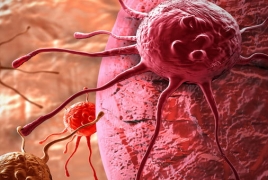Breast cancer cells 'stick together' to spread through body: study September 11, 2019 - 12:03 AMT PanARMENIAN.Net - Researchers at the Johns Hopkins Kimmel Cancer Center discovered that a cell adhesion protein, E-cadherin, allows breast cancer cells to survive as they travel through the body and form new tumors, a process termed metastasis. Their conclusions, obtained through laboratory experiments and in mouse models, help explain how metastasis works in the most common form of breast cancer, invasive ductal carcinoma. E-cadherin appears to limit molecular stresses within the cancer cells and allow them to survive long enough to form new tumors. The finding, published online in the Sept. 4 issue of Nature, could lead to new ways to prevent breast cancers from recurring in patients, Science Daily reports. "Previously, researchers thought that it was essential for cancer cells to lose E-cadherin in order to metastasize," says study leader Andrew Ewald, Ph.D., professor of cell biology and co-director of the Cancer Invasion and Metastasis Program at Johns Hopkins Kimmel Cancer Center. "This was difficult to reconcile with the fact that breast tumors in patients typically continue to express E-cadherin. Our study was designed to test the role of this protein during metastasis." The overwhelming majority of breast and other cancer deaths are caused by metastasis; consequently, preventing metastasis is a crucial cancer research goal, he says. Scientifically, metastasis is characterized by many separate stages, including when cancer cells invade healthy breast tissue, escape the primary tumor, enter and survive within blood vessels, exit into new organs, then survive and seed a new tumor in a distant organ, such as the lungs. Cancer cells break free from the primary tumor early in metastasis and much research has focused on how cancer cells stick together at the molecular level, through the protein E-cadherin. In some cancers, such as a form of breast cancer known as invasive lobular carcinoma, genetic mutations that eliminate E-cadherin appear to be pivotal for metastasis to occur. However, other types of cancer -- such as invasive ductal carcinoma, the most common form of breast cancer, responsible for more than 80% of all breast cancer diagnoses -- retain this protein or even overexpress it, a discrepancy that scientists couldn't explain. Authorities said a total of 192 Azerbaijani troops were killed and 511 were wounded during Azerbaijan’s offensive. In 2023, the Azerbaijani government will increase the country’s defense budget by more than 1.1 billion manats ($650 million). The bill, published on Monday, is designed to "eliminate the shortcomings of an unreasonably broad interpretation of the key concept of "compatriot". The earthquake caused a temporary blackout, damaged many buildings and closed a number of rural roads. Partner news |